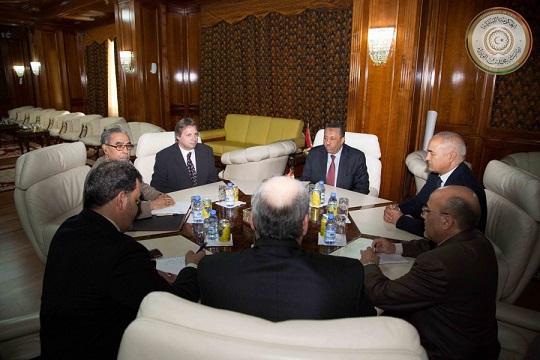By Jamal Adel and Noura Ibrahim.
Tripoli/Benghazi, 18 June 2014:
On top of the continuing deadly fighting in the city, electricity cuts totalling . . .[restrict]up to 12 hours a day are adding to Benghazi’s miseries.
“It’s too dangerous to go out and without power we can’t do anything at home either. There’s no television, no internet, no air conditioning,” said one exasperated Fuwayhat district resident where, as in the rest of the city, the electricity went off at midday today. It came back on in Fuwayhat only at 9:45 this evening. Elsewhere it came back slightly earlier, at Hadaieq at 8 pm and in Leithi at 7pm.
Yesterday the cuts were from 6 pm until about 11 pm.
With power to local relay base stations cut. the outages affected mobile phone coverage as well.
Other places of the east have likewise been hit in days of cuts. The Libyan new agency LANA reported three days of outages in the desert oases towns of Jalu, Awjila, Jakharra and Tazerbu in the south east of the country. Last week and this week too, there have been cuts in several Tripoli districts.
The cuts in Benghazi are being blamed in part on the fighting there, with power lines being brought down.
However, the manager of Sarir power station, Hashim Al-Maliki, blamed them on a combination of reasons.
“We’re facing a fuel supply problem in Sarir power station as a result of which our usual production of 500 megawatts is down into 230 megawatts.” Additionally there was work reconnecting power lines near Gemenis, on the Benghazi-Ajdabiya section of the national grid. But this was unfinished.
“We suffer from the lack of security. It prevents us from working normally,” Maliki said. “Our engineers are trying to work in very difficult conditions and in areas where there is no security at all.” Additionally, because of the general security situation, he said, many foreign engineers had left the country.
Another problem, he said was a lack of spare parts.
“We have a shortage of gas and fuel supplies,” said GECOL spokesperson, Lutfi Ghoma, concurring with Maliki’s main explanation. “We’re operating just two units at Misrata and Sarir [power stations].”
Normally, the country’s power stations had a daily production of between 5,000 and 6,000 megawatts, he said, with consumption at less than 5,000 megawatts. Production was now down, but he would not say by how much.
Events in Benghazi had also significantly impacted on the supply nationwide, with power line cuts, he added, explaining that Benghazi North power station was working but on reduced capacity. However, it was gradually restoring production, he said.
Faced with the mountain of cuts, the cabinet has decided to set up an emergency ministerial committee, giving it executive powers to solve the problem.
For many in Tripoli and Benghazi, however, the electricity problems – and the petrol crisis in the capital – are not the result of maintenance work coinciding with violence in Benghazi bringing down power lines or engineers refusing to go out to work because of security concerns. There is a growing belief that the power cuts and the petrol crisis have been deliberately orchestrated to “punish” Libyans.
By whom is another matter. It depends on who one is speaking to. Many blame Islamists, Others say members of Congress or Qaddafi supporters.
Whoever the cuplit, the belief that the cuts are deliberate is getting stronger. [/restrict]









